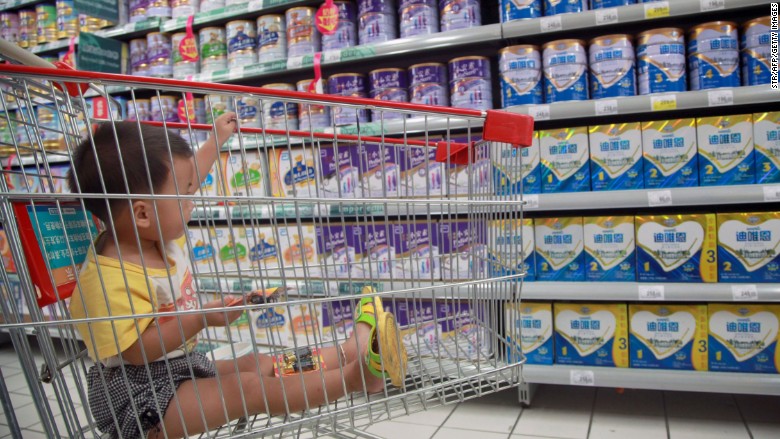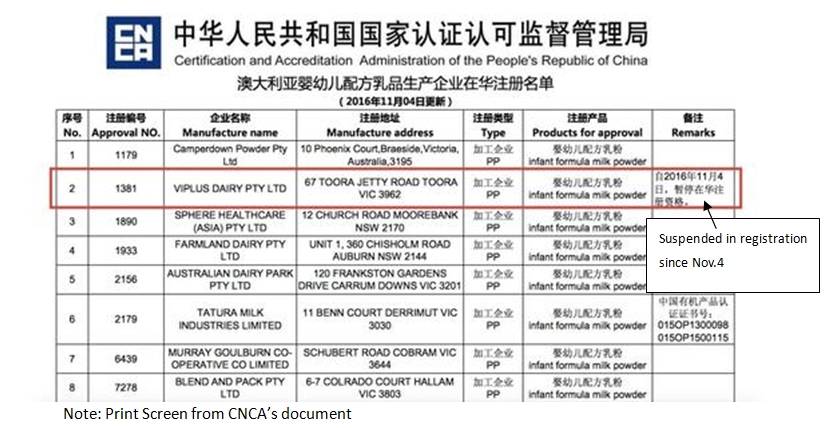One more Australian infant formula
enterprise with over 100-year history has been suspended in its registration in
China. It is once again a sign of the Chinese government to strengthen
supervision on overseas imported infant formula, according to analyst CCM.

Source: Bing
According to the latest list of
Australian infant formula enterprises registered in China released by China’s Certification
and Accreditation Administration (CNCA), the Viplus Dairy Pty Ltd. (Viplus
Dairy) is suspended for its registration in China since Nov. 4. In fact, Viplus
Dairy is already the second dairy enterprise that gets suspended in China in
this year (2016).
Based on the list, Viplus Dairy registered
for its infant formula milk powder in China. That’s to say, the suspension this
time has disqualified Viplus Dairy to sell its infant formula milk powder in
China.

Several brands under Viplus Dairy in China
Founded in 1893, Viplus Dairy is located
in South Gippsland, Australia. With over 120-year history, Viplus Dairy is one
of the earliest dairy enterprises to produce and develop infant formula milk
powder in Australia.
There are several brands under Viplus
Dairy selling in China currently, including Viplus, Anbolac, Optimum, Olibaby,
My Cravings and etc. A staff from Viplus (China)
Dairy Co. Ltd., Viplus Dairy general agent in China, disclosed that Viplus
Dairy still had no idea about the suspension on its registration in China. They
received no related notice and would verify on the suspension.
Unqualified products or unqualified dairy enterprises may lead to registration
suspension in China
In fact, earlier in June 2016, China’s
general Administration of Quality Supervision, Inspection and Quarantine
(AQSIQ) had an publication on its inspection on imported food in China from
Jan.- May 2016 and announced that the 3.8 tonnes of infant formula milk powder produced
and imported by Viplus Dairy was unqualified for its labels.
Song Liang, senior dairy analyst in
China, disclosed to CCM that, several
reasons could cause registration suspensions in China, such as unqualified
products found in inspection during customs declaration; irregular
certifications of the dairy enterprises; irregular market circulation; and food
safety problems.
Strengthen on supervision on imported dairy products
Since the melamine milk powder scandal
happened in China in 2008, China has a strong demand for imported milk powder. In
order to better manage on the imported milk powder, AQSIQ released the Notice on Strengthening Management on
Imported Infant Formula Milk Power (Notice): since May 1 2014, infant
formula milk powder from overseas dairy enterprises which don’t register in
China cannot be imported to China.
According to the Notice, overseas dairy enterprises are allowed to register in
China only after its source, production, storage, transportations and etc. pass
the inspection by AQSIQ.
“If there is no special occasion or
warning, the infant formula which are imported before the registration
suspension are still able to sell in China. However, the subsequent infant formulas
are suspended in importing. If the suspension period lasts too long, the dairy
brands will be hugely affected in sales in China,” stated Song.
In fact, Viplus Dairy is already the
second Australia dairy enterprise to be suspended in registration in China in
2016.
In Sep. 2016, Camperdown Dairy Company Pty Ltd.
(Camperdown Dairy), another Australia
dairy enterprise, was also disqualified in its registration in China.
Camperdown Dairy is also an old
dairy enterprise with 125 years history. Its import products to China include fresh
milk, fermented milk, fermented flavor milk, butter, cream and etc.
However, in Aug. 30, CNCA announced that
staphylococcus aureus and colibacillus were detected exceeded in fresh milk
produced and imported from Camperdown Dairy.
It is at the same time that CNCA
announced to entirely strengthen supervision on Australia dairy enterprises.
In order to assess and control the risks
during production and transportation of Australian fresh milk, the CNCA also
required local government departments and the 41 registered fresh milk
companies to submit related technology certificates within a certain period;
the CNCA will organise experts to conduct technological examinations to keep
the registrants up to speed on this.
This stepping up of supervision will
raise uncertainty in the Australian industry, for which China is the largest
export destination. In 2010-2015, the volume of this trade rose at a CAGR of
29.8%. In 2015/16 it reached 88,900 tonnes (= USD186.6 million OR AUD245.8
million); so far 188 dairy plants in Australia have been registered in China,
including 8 infant formula producers.
Australia or even the overseas dairy
enterprises should better prepare themselves to get their dairy products
imported to China’s market.
Looking for more information on dairy market
in China? Want to monitor what’s happening in dairy industry in China? CCM Online Platform is here to help you! An infinitive database, covering the whole food industry
in China, gives you ENTIRE access to CCM’s over 15-year data and intelligence.
To get real-time news and reports on
dairy market in China immediately, don’t hesitate! Get your 7-day
free trial NOW!